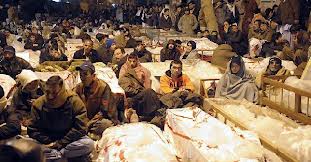
An unprecedented protest is unfolding in the Balochistan city of Quetta in Pakistan. Thousands of people have staged a sit-in, and are using coffins to block a road to protest the slaughter of Shia Muslims by Sunni Muslim terrorists allied with the Taliban.
On Thursday night, January 10, twin bombings targeting Pakistan’s tiniest ethnic minority, the Hazaras — descendants of Central Asians and who are distinguished easily by their unique facial features — killed over 100 young men at a snooker club.
The attack was the latest in a slow-motion genocide of minority Shia Muslims in Pakistan by Sunni-Muslim extremists who consider the Shia as infidels, thus worthy of death. Many attacks against Shia Muslims are carried out by Lashkar-e-Jhangvi (LeJ), a militant Islamic group allied with al-Qaida and the Taliban. This time too the LeJ promptly claimed responsibility for the slaughter.
So far the Hazaras have endured every killing and attack with silent suffering, hoping their lack of response would be rewarded by a cessation of targeted attacks. But not this time.
The sight of 100 mangled bodies, including that of Pakistan’s leading Shia youth activist for human rights, Khudi Ali seems to be the straw that broke the camel’s back.
Instead of burying the dead, as is required by Islamic law, the Hazara Shia Muslims have taken the coffins to the streets and refused to bury the deceased unless the government assures them of protection against jihadi groups tied to the Taliban.
For over 24 hours now the Hazara Shias of Quetta have braved sub-zero temperatures that dropped to -10C, and are refusing to vacate the blocked road or to bury the dead. So far there has been total inaction by all levels of government. Frightened by the Islamic terrorists, it seems the country’s president, prime minister and the provincial chief minister, have all cowered down in their respective shelters, not knowing if it would be safe, exposing themselves among the ordinary mourning Hazaras.
As far as the military is concerned, they already administer, though unofficially, the province of Balochistan where this slaughter took place. In Balochistan, the Pakistan Army has been fighting the indigenous Baloch population for the last five years to crush their struggle for independence from Pakistan. If 100,000 troops cannot provide protection to the Hazara Shias, I doubt if another detachment of troops will help.
Although the Baloch nationalists seeking separation from Pakistan are sympathetic to the plight of the Hazara Shia and make common cause against the Taliban, they view the demand for military intervention with justified suspicion and cynicism. One Baloch activist summed it best when he tweeted:
“Hazaras Shias asking the killers to protect them? Shia Genocide Baloch Genocide being carried out by Pakistani Army & ISI in Balochistan.”
If Pakistan’s men in uniform wished to help, they could easily cut off all ties to the jihadi terrorists and liquidate them. Instead, they perform a strip-tease for America and the Pakistani population, acting as if they are fighting the jihadis while giving the Taliban leadership of Mulla Omar shelter in Quetta.
Destabilizing Pakistan before an election
The fresh slaughter of the Shia in Pakistan comes in the wake of other events unfolding in Pakistan that seem to suggest its part of an attempt to destabilize the country and thwart parliamentary elections due in a few months.
Clashes with Indian Army on the volatile Kashmir border plus a planned “long-march” by a Tahir-ul-Qadri, Sunni cleric who has arrived from Canada, point to a concerted effort to pave way for the military to step in and take over as an “interim government” to conduct “proper” elections — a tactic used in the past my army commanders.
The Sunni Islamic terrorists of the LeJ, who proudly claimed responsibility for the Thursday night massacre, are a product of the Pakistan Army in its strategy to use non-state actors to create mayhem in India and Afghanistan. No one will be surprised if it turns out the latest slaughter of Shias was merely one act in the larger theatrical play to bring democracy into disrepute and making it palpable to endure another phase of military authoritarianism in Pakistan.
No matter how this play unfolds, the Pakistan created by a Shia Muslim, Mohammed Ali Jinnah, today lies in ruins, being torn apart as vultures gnaw at its carcass. It was near Quetta, Balochistan that MA Jinnah came to die and it is perhaps Balochistan where the country he created will finally unravel into dust.
Had it not been a nuclear power with 200 missiles pointed at India and unknown western interests in the region, we could have shrugged off the failed experiment. But Pakistan today needs to be watched as the single largest source of anti-Western terrorism and the nurturing ground for the ideology of global jihad.
The Shia and Ahmadi Muslims that are being killed, together with Pakistan’s beleaguered Hindu minority as well as traumatized Christian community, should be seen as canaries in the mine. In their demise is a warning to the rest of us. A nuclear power is about to collapse.

